Welfare types
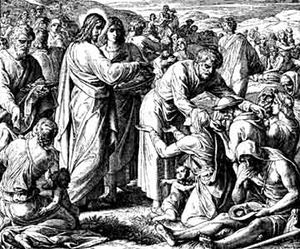
Hope vs Entitlements
Society must come together and become a viable community to survive the natural and man made cataclysms and catastrophes that frequent life on this planet.
Every cohesive society has some form of Welfare to provide for the needy in times of difficulty and nurture the survival of society as a whole by aiding the individual in distress.
There are two types of welfare based on method and use within society.
As there were two sons of Adam and Eve these are two types of welfare providers.
- One is based on charity and hope. Its leaders act with the nature of the good shepherd who leads his flock which follows because he leads them beside the still waters an makes it so they may lie down in green pastures and always seeks to protect and provide for them no matter what the personal cost to himself.
- The other depends on force and entitlements. Gifts, gratuities and benefits are provided by an exercising authority of rulers which call himself a benefactor but who compel the people into an organized state like Cain, Nimrod, the evil Pharaoh, and even the Caesars of the world. His way falls short of the Perfect law of liberty. He will eventually become a brute and ruler over his brother and the people will become perfect savages.
Each of these systems require sacrifice of what part of society to aid other parts.
The first system of welfare depends on love and free will offerings of the people, by the choice of the people, for the benefit of the people.
The other system compels the offerings of the people, depending on the authority of some. This second system centralizes power in the hands of a few which historically has corrupted the whole system. With the shift in the power to choose one part of society becomes drugged or intoxicated by the power until more and more power is sought and then abused. The other part of society is also drugged or intoxicated becoming weak and apathetic in the performance of its labors.
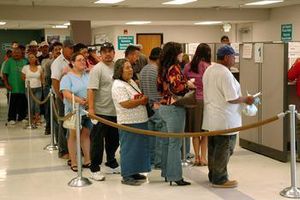
These two elements of this second welfare society of the state began to war against the well being of both with the bulk of society becoming indifferent to the needs of the members of society and their own needs become the priority an compelling force in their lives.
The laborers of society began to resent and hate the wealthy and ruling elite members and become more concerned with their personal survival or comfort than the survival and comfort of their fellow member. When the ruling elite tried to placate the mob of the common people with benefits they often decimated the middle class who now also resented the poor or at least the slothful or undeserving poor. All these systems were plagued with corruption.
Ancient Rome was the father of many modern government programs, including welfare systems that subsidized food, education and other provisions for the needy. Rome was not alone in their pursuit of this new deal created to provide social welfare for the people. Other countries create similar systems. Herod the Great started such a system which you could join by the ritual of baptism and public registration.
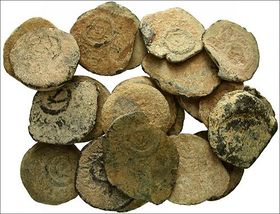
Early Rome as a republic provided these benefits of society through free will offerings for centuries. Eventually people began to seek entitlements rather than rely on hope and charity alone.
Their entitlement programs date back to 122 B.C.. Tribune Gaius Gracchus instituted lex frumentaria, a law that ordered Rome’s government to supply its citizens with allotments of cheaply priced grain. He also instituted reforms which dealt with the judiciary system including an attempt to bar corrupt judges through the opinion of the people. He also reformed military service, and forbade the draft of boys under the age of seventeen and more all with the intent of improving morale and to win the political support of soldiers, allies, and poor voters.
These early forms of welfare continued under Trajan, who implemented a social welfare system called “alimenta” to help feed, clothe and educate orphans and poor children. Other items including corn, oil, wine, bread and pork were eventually added to the list of price-controlled goods, which may have been collected with tokens called “tesserae.”
This tesserae was one of the earliest forms of an EBT welfare card. Electronic Benefit Transfer (EBT) is an electronic system that allows state welfare departments to issue benefits via a magnetically encoded payment card, used in the United States and the United Kingdom like Rome did with their Tesserae.. It identified you as a eligible recipient. These systems take their toll on freedom an society. They are not really free.
- Psalms 69:22 Let their table become a snare before them: and that which should have been for their welfare, let it become a trap.
- Romans 11:9 And David saith, Let their table be made a snare, and a trap, and a stumblingblock, and a recompence unto them:
These generous handouts helped Roman emperors win favor with the public, but some historians have argued that they also contributed to Rome’s economic decline to say nothing of the degeneration of character of the people.
“The real destroyers of the liberties of the people is he who spreads among them bounties, donations, and benefits.”[2]
These tokens known as tesserae, meaning "tile". They were evidence of your entitlements but also of your entanglements under Roman authority of the Roman world.
The tesserae hospitālēs were evidence of the Obligations of Hospitium where obligations imposed by a covenant were of the most sacred character, and any failure to regard its provisions was considered sacrilege, bringing upon the offender, the anger of Iuppiter Hospitālis..
These ties were hereditary, descending from father to son, so that persons might be hospitēs who had never so much as seen each other, whose immediate ancestors even might have had no personal intercourse. As a means of identification the original parties exchanged tokens tesserae hospitālēs.[3]
"This same systems was use to provide government welfare. It is clear that these are almost precisely the duties an practices devolving upon members of our own great benevolent societies at the present time when appealed to by a citizen in distress."[4]
Tesserae frumentariae and nummariae were tokens given at certain times by the Roman magistrates to citizens, in exchange for which they received a fixed amount of wheat or money.[5]
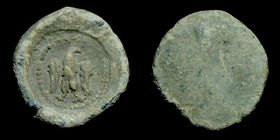
TES′SERA, (κύβος), was "a small tablet (as of wood, bone, or ivory) used by the ancient Romans as a ticket, tally, voucher, or means of identification." [2]
The Roman symbol was the eagle and they used these tiles for centuries for many purposes. But as the citizens became more and more dependent and enfranchised. So it is a matter of history that "The Roman Empire used tiles called tesserae to identify slaves, soldiers, and citizens over 2,000 years ago."[3]
Tesserae frumentariae and nummariae were tokens given at certain times by the Roman magistrates to the poor, in exchange for which they received a fixed amount of cornº or money.[6]
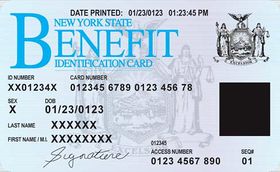
The modern EBT Card is used much like the Tesserae of the Roman Empire, You can get food provided by the government and subsidize by taxing your neighbor. This form of socialism divides communities because it is not based on free will offerings but upon taxes.
Note the Roman symbols on the card. We should understand the fate of Rome when it went the way of the socialist state. These welfare systems of underwriting the cost of food aided the rise of tyrants in Rome. Once society accepted the idea that it was okay to take from your neighbor to provide welfare in the care of the needy Rome was doomed as a free people.
But to get that EBT card you will need another card or know the number on that card.
A Detailed Study of the Mark of the Beast
What is this Mark of the Beast and what is the Mark of God?
http://www.hisholychurch.org/sermon/mark2.php
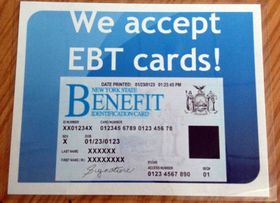
One of the major Christians_conflict between those following Christ and Rome was over participation in the welfare systems of Rome. Christians had their own welfare system.[4] "The welfare state is not God's answer."[5]
The Roman system of social welfare changed the nature of society and soon society was bankrupt and failing economically and morally.[6]
“Redistribution is immoral... it allows one person to treat another as no more than a means...”[7] The welfare state is the enemy of religion.[8] When pure religion diminishes, socialism flourishes.
Some people through social compact give the state the power to take from its members for the welfare of society. That power has been deemed a foolish rejection of God.[9]
“It is impossible to introduce into society a greater change and a greater evil than this: the conversion of the law into an instrument of plunder.”[10]
“All socialism involves slavery”[11]
“Socialism is the religion people get when they lose their religion”[12]
“I will never live for the sake of another man or ask another man to live for mine”[13]
We must learn to distinguish between charity and socialism. Charity is good, socialism is evil. (Pr. 14:30, 31, 19:17) Charity is for the helpless poor while [the socialist's] welfare makes the poor helpless. (Ga. 2:10)”[14]
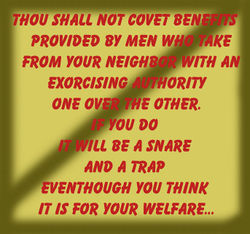
The spirit of evil
The following is not true but has been reported and disseminated as true and to some degree it is a plan that is used by evil throughout the history of man.
"In May of 1919 at Dusseldorf, Germany, the allied forces obtained a copy of some of the Communists Rules for revolution. Nearly 50 years later, these RULES are still being followed. As you read, stop after each item and think about the present day situations where we live - and all around our nation."
We quote these rules:
- . Corrupt the young, get them interested in sex. Make them superficial; destroy their ruggedness.
- . Get control of all means of publicity, thereby get people's minds off their government by focusing their attention on entertainment, sexy books and plays and other trivalities.
- . Divide the people into hostile groups by constantly harping on the controversial matters of no importance.
- . Destroy the people's faith in their natural leaders by holding them up to contempt and ridicule.
- . Always preach true democracy, but seize power as fast and as ruthlessly as possible.
- . By encouraging government extravagance, destroy its credit, produce fear of inflation with rising prices and general discontent.
- . Promote unnecessary strikes in vital industries, encourage civil disorders and foster a lenient and soft attitude on the part of the government toward such disorders.
- . By specious argument cause breakdown of the moral virtues, honesty, sobriety, continence, faith in the pledged word.
- . Cause the registration of all firearms on some pretext, with a view to confiscating them and leaving the population helpless.
Folklorist Jan Harold Brunvand will write: “The rules have to do with dividing people into hostile groups, encouraging government extravagance, and fomenting unnecessary ‘strikes’ in vital industries. What we have lost, the list suggests, is a world without dissent, budget deficits, inflation, and labor unrest. I just can’t remember any such Golden Age.” [15]
The power to enforce Rules corrupts. The more rules the more corrupt society. The less rules we have, the purer the game.
We should be attending to the Weightier matters of the law, judgment, mercy, and faith which include caring for the needs of our neighbors and the widows and orphans of our society through Pure Religion in matters of health, education, and welfare. We are NOT to provide for the needy of society through the Covetous Practices and the men who call themselves benefactors but who exercise authority one over the other like the socialists do.
The Way of Christ was like neither the way of the world of Rome nor the governments of the gentiles who depend on those fathers of the earth through force, fear and fealty who deliver the people back in bondage again like they were in Egypt. Christ's ministers and true Christians do not depend upon systems of social welfare that force the contributions of the people like the corban of the Pharisees which made the word of God to none effect. Many people have been deceived to go the way of Balaam and the Nicolaitan and out of The Way of Christ and have become workers of iniquity.
The Christian conflict with Rome in the first century Church appointed by Christ was because they would not apply to the fathers of the earth for their free bread but instead relied upon a voluntary network providing a daily ministration to the needy of society through Faith, Hope, and Charity by way of freewill offerings of the people, for the people, and by the people through the perfect law of liberty in Free Assemblies according to the ancient pattern of Tuns or Tens as He commanded.
The modern Christians are in need of repentance.
"Follow me!" —Jesus the Christ.
- One of the most important things to do is to become involved in a network of Charitable Practices. Everyone should want to join a Living Network of Love and Charity.
- If you think you have a calling to be a Minister of God or you might want to dedicate your life to Christ as an Ordained Minister of His Holy Church, contact us to start the process of discipleship and become the benefactors who exercise only love, NOT authority.[16]
Benefactors |
Fathers |
Conscripted fathers |
Pater Patriae |
Patronus |
Rome vs US |
Gods |
Imperial Cult of Rome |
Apotheos |
Supreme being |
Corvee |
Employ |
Corban |
Christian conflict |
Merchandise |
Bondage |
Citizen |
Protection |
Birth registration |
Mark of the Beast |
Undocumented |
Religion |
Public religion |
Pure Religion |
False religion |
Cult |
Tesserae |
Covetous Practices |
If I were the devil |
Biting one another |
Cry out
Footnotes
- ↑ The word "strengthen" is also seen as relieve in Leviticus 25:35 "And if thy brother be waxen poor, and fallen in decay with thee; then thou shalt relieve him: yea, though he be a stranger, or a sojourner; that he may live with thee." It is from קזח chazaq meaning "to strengthen, prevail, harden"
- ↑ Plutarch, 2000 years ago.
- ↑ see Rich and Harper, s. v.
- ↑ THE PRIVATE LIFE OF THE ROMANS BY HAROLD WHETSTONE JOHNSTON PROFESSOR OF LATIN IN THE INDIANA UNIVERSITY CHICAGO SCOTT, FORESMAN AND COMPANY 1909
- ↑ Smith, Sir William (1859), A dictionary of Greek and Roman antiquities (2 ed.), Little, Brown, and Co., p. 550 [1]
- ↑ Sueton. Aug. 40, 42, Nero, 11.
- ↑ The Kantian ethic of capitalism. Harold B. Jones, Jr.
- ↑ State Welfare Spending and Religiosity, A Cross National Analysis by Anthony Gill and Erik Lundsgaarde.
- ↑ Ex. 20:17, 1 Sa. 8; 13:13, Ro. 7:7, 13:9, Col. 3:5, Heb. 13:5, 2 Pe. 2:3-14
- ↑ Frederic Bastiat, 1801 – 1850, French theorist, political economist.
- ↑ Herbert Spencer, 1820 – 1903, an English philosopher.
- ↑ Richard John Neuhaus, 1936 – 2009, prominent American clergyman.
- ↑ Atlas Shrugged, Ayn Rand. Inscription above Galt’s Gulch powerhouse.
- ↑ Evangelical Bible College of Western Australia Commentary. Revelation by Dr Peter Mose [Book 97-2] July 2004
- ↑ Stickney, 1996, pp. xx; Free Inquiry, 1999; Rosa Luxemburg, 2003; Snopes (.com), 7/10/2007
- ↑ Matthew 20:25-26 But Jesus called them unto him, and said, Ye know that the princes of the Gentiles exercise dominion over them, and they that are great exercise authority upon them. But it shall not be so among you: but whosoever will be great among you, let him be your minister;
Mark 10:42-43 But Jesus called them to him, and saith unto them, Ye know that they which are accounted to rule over the Gentiles exercise lordship over them; and their great ones exercise authority upon them. But so shall it not be among you: but whosoever will be great among you, shall be your minister:
Luke 22:25-26 And he said unto them, The kings of the Gentiles exercise lordship over them; and they that exercise authority upon them are called benefactors. But ye shall not be so: but he that is greatest among you, let him be as the younger; and he that is chief, as he that doth serve.
About the author
Subscribe
HELP US at His Holy Church spread the word by SUBSCRIBING to many of our CHANNELS and the Network.
The more subscribers will give us more opportunity to reach out to others and build the network as Christ commanded.
Join the network.
Most important is to become a part of the Living Network which is not dependent upon the internet but seeks to form The bands of a free society.
You can do this by joining the local email group on the network and helping one another in a network of Tens.
His Holy Church - YouTube
https://www.youtube.com/user/hisholychurch
Bitchute channel will often include material that would be censored.
https://www.bitchute.com/channel/o6xa17ZTh2KG/
Rumble Channel gregory144
https://rumble.com/user/gregory144
To read more go to "His Holy Church" (HHC) https://www.hisholychurch.org/
Brother Gregory in the wilderness.
https://www.youtube.com/channel/UCJSw6O7_-vA4dweVpMPEXRA
About the author, Brother Gregory
https://hisholychurch.org/author.php
PreparingU - YouTube
https://www.youtube.com/channel/UC9hTUK8R89ElcXVgUjWoOXQ
Facebook
https://www.facebook.com/HisHolyChurch
Follow on X
https://x.com/HisHolyChurch
X-Space gathering Friday at 6pm PST
https://x.com/GregoryHHC
Join the network
